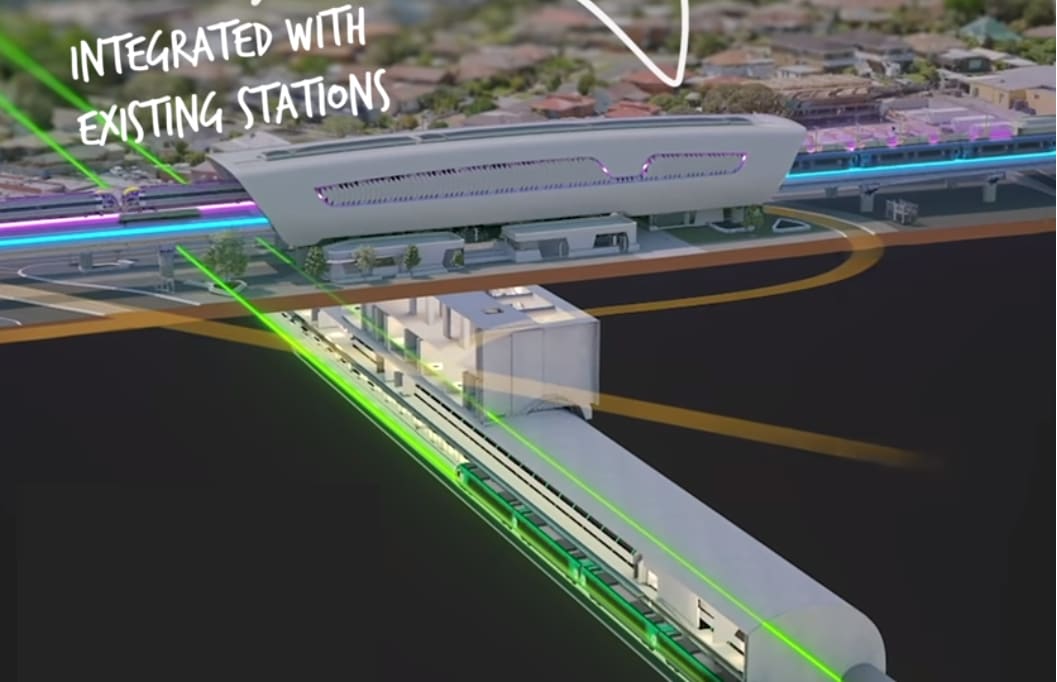Victorian Government says Melbourne's Suburban Rail Loop will be an operationally-independent railway
A question that has existed ever since the Suburban Rail Loop project was announced in the run-up to the 2018 Victorian State Election has been answered. The Suburban Rail Loop line and system will be different from the existing Melbourne rail network, much the same way the Sydney Metro system under development in New South Wales differs from the existing Sydney Trains network.
Marking the 1 year anniversary of his government, the Victorian Premier Daniel Andrews, announced the Suburban Rail Loop that was unveiled as a key re-election policy in 2018 will be a standalone railway, operating independently of the existing Melbourne rail network.
Operationally independent, but still integrated at the key interchange stations which will provide the interface with the new line, gives the State Government wriggle room when it comes to setting the parameters for the new infrastructure, and some of those parameters are now clearer.
On Sunday, the State Government released a media statement.
The Surban Rail Loop will be built as a separate rail line, meaning it can use state-of-the-art systems from around the world without having to retrofit technology into the existing network - saving time and money
Being a dedicated line also means the design of the trains that use the line won't be constrainted by the requirements of Melbourne's hundred-year-old train network.
As a result, the new trains will be four to five carriages long and faster than the existing fleet.
Being smaller, means they can turn up more often, and that the platforms will be shorter - reducing the distance passengers need to walk at the station each day to get on the train.
It follows that with shorter platforms, the cost to build stations will be cheaper when compared to those that are currently under construction on the Melbourne Metro Tunnel project.
Pre-construction work on the first stage of the route from Cheltenham to Box Hill is underway with the government stating 14 boreholes have already been dug as part of the geotechnical investigations phase of the project. Up to 100 will be drilled by mid-2020, according to the government media statement.
Community consultation and market engagement related activities are expected to increase next year and construction is still expected to begin by 2022.
Comment
More than 12 months on from the election and the original policy unveiling, the latest animation and statements produced by the state government still remain very high-level.
We still see a generic map that looks like more effort was put into it through the eastern and northern sides of Melbourne, yet in the west we still see the SRL running directly from Sunshine to Werribee.
The 'we'll start the build and other governments will finish it' rhetoric is still the same and other local media are reporting that the Premier stated he would prefer the new system to have drivers (despite the fact the very parameters we now know by virtue of the statements today point to a driverless system).
Those details are still being worked out, according to the Premier. Sure enough, multi-millions were allocated in this year's state budget and we're promised to see the outcomes of all that work next year - where hopefully many other questions will be answered.
Regardless, the latest drip-feed does start to paint a picture of a new rail line that, on the face of it, might stretch a $50 billion figure a lot further than what some people would understandably think. That is of course if the projected cost of the entire project is still $50 billion - we simply won't know until the business case is released and it's worth pointing out that the previously trotted-out figure was not present in Sunday's media statement.
The other thing to watch for when the business case does get released is how it will interface with other profile public transport projects - the Melbourne Airport Rail Link and the Western Rail Plan - because today didn't appear to answer any questions in that department either.
Private investment will be welcomed according to the Premier - whether that means a direct financial/ownership stake in the new rail infrastructure or developing land surrounding stations is not clear either - but it's worth taking a look at what is already present in the development pipeline for each station location.
That's going to be a focus over the next few weeks on Apartments.com.au and to kick things off, I present a map of Box Hill developments on the database. It's not outside the bounds of possibility that each suburb that will see an SRL station will look like this once the SRL is under construction.
Up next, a look at the pipeline and planning regimes at various phase 1 station locations: Suburban Rail Loop in focus: Cheltenham
